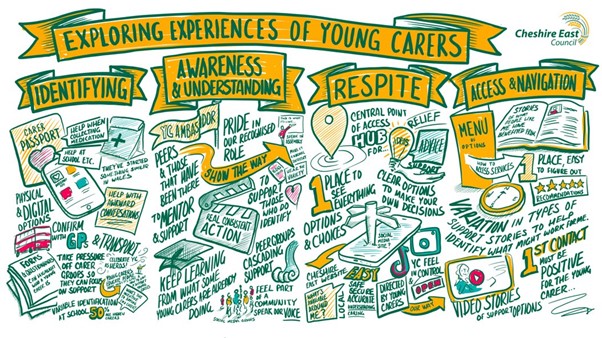
Carers Week is an annual campaign to raise awareness of caring, highlighting the challenges unpaid carers face and recognising the contribution they make to families and communities throughout the UK. The theme of Carers Week 2022 is to 'Make caring visible, valued and supported'. Earlier this year, ICE worked in partnership with Cheshire East Council to explore the lived experiences of carers in Cheshire East, with a particular focus on young carers. This research resulted in a number of practical solutions that echo the mission of carers week to identify and support young carers in Cheshire East to flourish.
Cheshire East Council identified that some young carers may be 'falling through the gap' and more needed to be done to ensure young carers are identified and supported. To gain a clear understanding of what this support would look like, ICE engaged 16 young carers and 16 professionals who interact and support young carers. The aim of this research was to explore what it’s currently like to be a carer, envisage what being a young carer is like at its best and to co-design solutions that can be applied to support them.
To gain this insight, ICE researchers carried out two virtual insight sessions and a co-design hackathon workshop to test and co-design solutions.
Through this research, we identified 4 key barriers to identifying and supporting carers.
In exploring ‘What needs to happen to support young carers to be their best?’ and overcome these barriers, four key themes were identified:
These themes represent ‘touchpoints’ that can help to illustrate and understand a positive carer journey.
Informed by this insight, ICE made 3 key recommendations:
These recommendations resulted in four co-designed solutions, developed and tested in collaboration with young carers and professionals through a co-design hackathon session. This session enabled critical evaluation of solutions to ensure they are practical and would directly improve the day-to-day lives of carers.
The co-designed solutions included:
The implementation of a young carer pass/card
Research suggests that a quick, easy and discrete tool like a card or ‘passport’ to signify that they are a carer would be beneficial. This can help overcome hesitancy from carers discussing being a carer publicly or with certain people, which many carers felt was too personal.
Designation of a young carer ambassador
Research suggests that an ambassador who can act as a point of contact for carers to speak would be appealing and practically beneficial. Importantly they would have an understanding of carer backgrounds and responsibilities, so ambassadors can better signpost carers and provide resources based on specific needs and in ways that don't feel judgemental.
Publicly speaking about and raising awareness for young carers
Carers believed more should be done to raise awareness about being a carer and agreed school assemblies would be a good place to do this. Carers, peers and professionals will benefit from speaking publicly/ raising awareness. This should be done sensitively, with feedback from school age carers themselves if they are comfortable with informing this.
A menu and central point of access for young carer respite and support services
Carers need to be given options that suit their needs (e.g. respite that matches transport capability, or that includes transport) in a way that is easy to access and understand. Carers would appreciate having a central point of access for activities and respite options, in a menu format that could be physical and digital.
The recommendations and solutions are visually summarised in the Young Carers scribe:

Each of these solutions aim to make carers visible by enabling them to engage in sensitive conversations with those around them and therefore allowing them to easily access the support available..
For more information about this research and details of how each solution can be applied in practice, email jordan.gilmour@icecreates.com to request the full research report and recommendations.